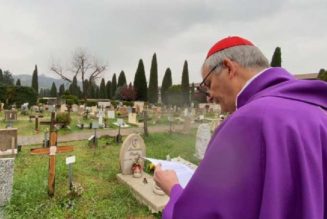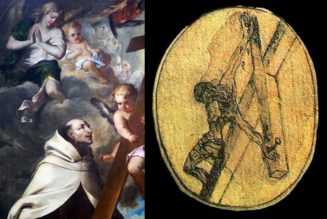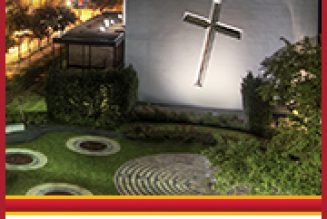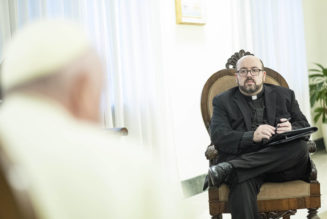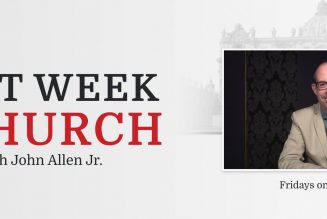
Imagine taking a small portion of every item in your fridge and cooking them into one dish tonight. You would probably end up with a gross mess for dinner. It may be “food” and provide some kind of nourishment, but it certainly isn’t going to taste good. Now imagine being served this mess at a restaurant. I highly doubt you would go back.
Yet, this is how most Catholic parishes approach ministry. The classes, events, programs, etc may not fit together, have continuity, and some may even compete with others. There is no intentional path that someone can walk. We don’t discern how everything fits the mission. Rather, we have a smorgasbord of stuff for everyone and anyone, regardless of how it all goes together. Is it any wonder that the way we operate isn’t working? The real question is – what do we do about it?
1 – NOT EVERY GOOD IDEA IS A GOD IDEA
It happens to every good parish leader at some point. A growing desire to help lead change starts to blossom, but the person / group doesn’t really know how to go about leading change. So, they read a book, go to a conference, hire a consultant, write a new pastoral plan, watch a video series, etc. All these can be helpful, but without discernment they can turn into a handicap, not help. This is because not every good idea is a god idea.
Think of all the good ideas out there right now. The groups that are building better Catholic leaders. The abundance of resources we didn’t have 10 years ago. The growing movement around renewal. What is a leader supposed to do with the overload? What will help them and/or their parish? They are supposed to discern what God wants in the midst of all these good things.
This leads us to another question – how does parish leadership discern as a group? The good thing is that our Church has given us a multitude of resources on how to discern. The hindrance is that most of them are focused on the individual, not the group. Still, the principles can apply.
For instance, taking St Ignatius of Loyola’s discernment of spirits, we can modify the process for a group, not just an individual. No matter what methodology of discernment we use, we need to do a few things with any process:
- Set aside enough time so you don’t rush through the process impatiently.
- Let God lead by casting off any preconceived notions about outcomes that you desire.
- Base any discernment on the core mission – making disciples.
- Be cautious of settling for human agendas, ideas, and ingenuity.
I will be posting one way of doing group discernment in the next few months. So keep tuned. But suffice it to say this – without discernment you may never know what is a good idea and what is a God idea, until it it too late.
2 – CONNECTION BEFORE COMMUNITY
Tell me if this sounds familiar. A parish wants to build better community, so they roll out a small group program to the parish. After spending thousands of dollars in resources, taking on a huge workload, and then providing training, the program launches to a big hurrah. Hundreds join dozens of small groups, which take off for months.
Fast forward a few years. There are two small groups still meeting (mainly the most “involved” parishioners) and the rest are merely a fond memory. In the post-mortem examination of what went wrong, nobody has a clear answer as to why they just didn’t “stick” or work long-term.
Now this blog can’t get into every reason this doesn’t work, but there is one principle we can take away from this grasping at community – connection comes before community. Modern people really value relationships, sincerity, and authenticity. They want to know do THEY matter to US before they will listen to what we have to say. Connection can’t be forced or programmed for.
Thus, community is not something that we just create by running a program. That is impossible. Rather, all true community is preceded by connections. The first connection is to God. A small group leader needs to have a personal relationship with God before they can offer the same to anyone in their group. Disciples make more disciples…not small groups. A small group leader who is connected to God and then forms a true connection to others is able to lead others to God. From these two connections, a true Christian community can start to be formed. Still, even the best of disciples won’t connect with everyone. So, we have to expect that connection with others will be difficult and take a long time. This is another reason discernment (see #1 again) is so key.
3 – TRANSFORMATION BEFORE INFORMATION
We are being drowned in information, both as a society and (in some lesser ways) as a Church. Think of all the amazing resources we have online now. Podcasts. Videos. Books. Blogs. Etc. It is truly overwhelming and sometimes hard to find our way through it all. Just giving someone a resource is not the answer. I know many parishes subscribe to some of these resources, give away books, bring in a speaker, or host a conference / parish mission, etc. Yet, these can only accomplish what they are meant to accomplish.
No conference can make ongoing relationships flourish. No book can look someone in the eye and walk with them through suffering. No video series can solve our parish problems. When we improperly use a resource we can’t blame the resource for the failure to secure the outcome we wanted. Thus, we need a shift in how we use them.
We need to aim for transformation first. Then we inform.
The unspoken assumptions we have in our Church are revealed by how we operate. For instance:
Not every person coming to Mass is in the same place, so why do we think one book we give to everyone will fit all their needs?
Not every person in our parish is a disciple, so why do we say “everyone is welcome” to something that ought to be aimed at disciples?
The overarching reason this happens is because information is easier than transformation. Catholic leaders are good at informing, but not as good at leading others to transformation. We can teach, but don’t know how to assess where someone is spiritually and (even more importantly) to respond appropriately. These are skills that can be learned, but renewal will not happen by accident. Thus, we need to grow as Catholic leaders in our own pastoral skill before we can count on large-scale transformation in others.
Don’t get me wrong, we are blessed to have all the resources we have. But, we have to understand that most people today will reject the information until they have experienced transformation.
4 – I AM NOT THE SAVIOR
If there is a more lonely position than being a Catholic Bishop, I don’t know what it is. People treat you differently, fail to be truly honest with you (unless it is expressed through anger). You have few peers and they aren’t near you. Truly tough.
Being a Catholic priest is just below this and just below this would be an on-fire Catholic who wants to evangelize and can’t find anyone to go on mission with them. You feel like a freak sometimes and it is easy to get discouraged or believe the lies. I have felt this too. In fact, I have written previously on the epidemic of lonely Catholics.
Recently, I realized that after I left parish ministry 4 years ago, I haven’t had a single local parish leader ask me to do assist in local parish efforts. There are many reasons this may be the case, but if someone who is a well-formed disciple who gets evangelization can’t be engaged…what chance do others have? But, unlike many others, I am not waiting around doing nothing.
In this mess, I must remember (and you do too) that we are not the savior and that we can’t see mission as something we just do at a parish. Even without being invited to help at the local parishes, I am investing in others. Evangelizing others. Discipling others. Accompanying others. I don’t need to do these things at a parish to do them well. But, this isn’t the case with most Catholics and we have to acknowledge that most Catholics are not disciples and even most of those who are disciples are not intentionally on mission regularly.
With all this being said, when can we just be honest and remember that none of us have it all together?
None of us have all the answers.
None of us can change the culture of our parishes alone.
None of us are superheroes that come to save the day.
We are broken, weak, limited, and messed up sinners. We need God’s grace, just like everyone else.
When we start there, we can allow God’s salvific grace to once again wash over us, and then be vessels of the same grace that spills out onto others.
That is all we have…Jesus.
Let God be God. We are bad enough being our true selves as it is.
Join Our Telegram Group : Salvation & Prosperity



